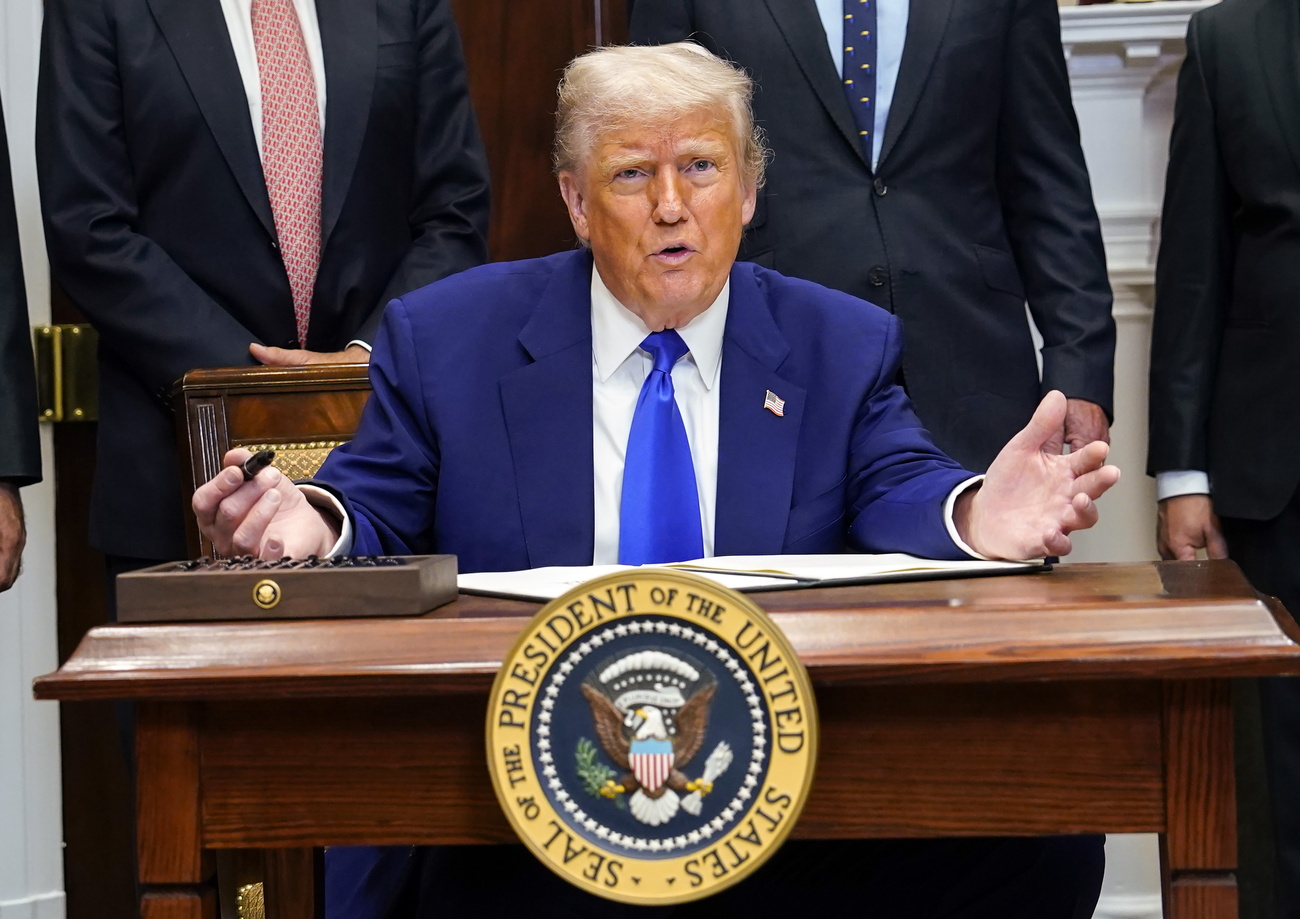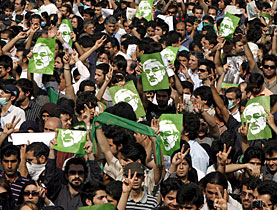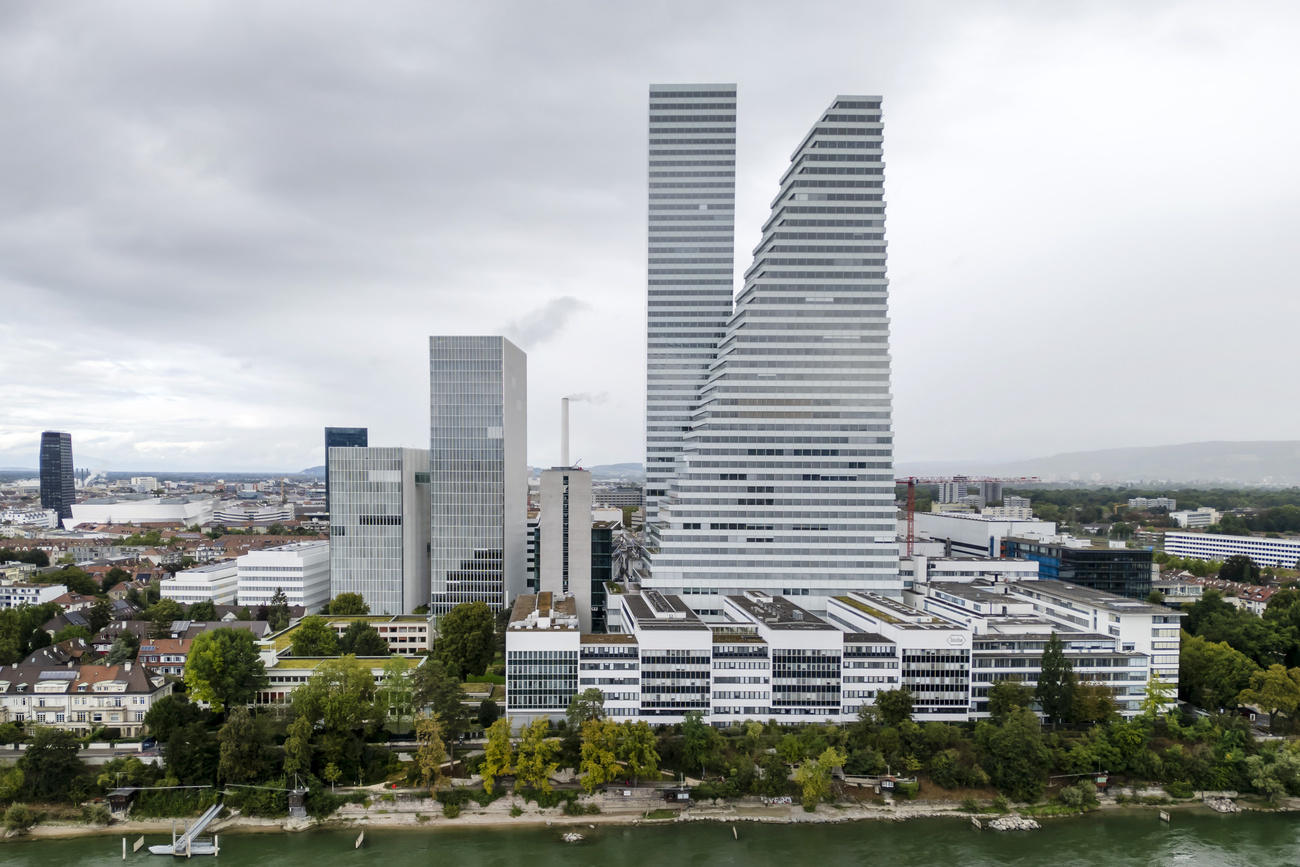
Experts gloomy over post-election Iran

The move by Iran's supreme leader Ayatollah Ali Khamenei to order an inquiry into vote-rigging claims in the presidential poll is meaningless, says a Swiss expert.
Khamenei’s intervention came as shots were fired during a third day of street protests by hundreds of thousands of reformists, who claim that official voting figures in Friday’s election were a “charade”.
On Saturday the Iranian government declared that President Mahmoud Ahmadinejad had won a landslide presidential victory: 63 per cent versus 33 per cent for Mir Hossein Mousavi, his main rival.
Defying an interior ministry ban, more than 100,000 protestors took to the streets of Tehran on Monday, shouting “God is great” and carrying pictures of Mousavi, who joined the crowds.
Dressed in his green campaign colours, protesters filled several kilometres of a main street, chanting “we fight, we die, we will not accept this vote-rigging”.
Security forces watched quietly, with shields and batons at their sides. But an Associated Press photographer saw one person shot and killed and several others who appeared to be seriously wounded in the square. The gunfire came from a compound for volunteer militia linked to Iran’s powerful Revolutionary Guard.
Iran’s leaders spent the weekend urging people to accept the election result but on Monday Khamenei ordered an investigation into claims of vote-rigging and fraud.
This comes after Mousavi and fellow defeated candidate Mohsen Rezai filed official complaints against the election result with the Guardian Council, the country’s powerful clerical group.
But Mohammad-Reza Djalili, an Iranian expert at the Graduate Institute of International and Development Studies in Geneva, said Khamenei’s move was a sham.
“The only possible appeal process is via the Guardian Council, where all the members are appointed by Khamenei himself; [this body] is responsible for the elections and it selected the four election candidates.
“And they now have ten days to say whether there was vote fraud or not – it is completely ridiculous,” he told swissinfo.ch.
“Massive and unprecedented fraud”
All three contenders to the presidency have raised serious doubts about the election result.
But Ahmadinejad and interior ministry officials have dismissed allegations the vote was rigged. The president has called the poll “free and healthy”. Ahmadinejad compared the protests over the past three days to the passion shown by football fans after a game.
Djalili said that although Iranian elections have always been tainted by irregularities various elements suggested “massive and unprecedented” vote fraud this time.
“There is the ridiculous number of votes that the Iranian president received in neighbourhoods where the opponents had a strong base, the speed with which the elections were proclaimed, and it’s obvious that the countryside, although they voted for Ahmadinejad, only represent 30 per cent of the population,” he said.
According to the Tehran-born political scientist, the Iranian system is incomparable with western democracies: there are no electoral lists, you vote where you like using just a birth certificate, fraud exists using multiple copies of a birth certificate – even those of someone dead or missing.
“And what’s more, the candidates don’t have official representatives at the voting booths or at the interior ministry where the count is done,” said Djalili.
“People are coming out on the streets as they think a miracle has happened at the ballot box: you vote X and it comes out Y.”
Turning point?
Dozens of opposition activists have been arrested since the protests began, while internet sites appear to have been blocked and the media heavily restricted.
France, Germany and Britain led the European Union campaign to persuade Iran to clarify the election results. The United States said it was concerned about the post-election situation in Iran.
In Kuala Lumpur Malaysian police fired tear gas to disperse about 500 Iranian students who staged a protest on Monday over the results of the election.
But it is unclear whether Iran is at a turning point. Farsin Banki, Swiss-Iranian professor of philosophy in Tehran, felt the protests would continue, but he was not sure for how long.
“The opposition is similar to that in Switzerland,” he said. “They don’t want a radical upheaval but a change of power within an existing Islamic Republic,” he told swissinfo.ch.
Paradox
Others were less sanguine. Hasni Abidi, director of the Study and Research Centre for the Arab and Mediterranean World in Geneva, said the presidential election showed the true paradox in Iran.
“The regime in power has managed to present itself as open, pluralistic and democratic, while actually it has hardly changed since 1979,” he told swissinfo.ch.
“Religious groups still dominate politics and democratic tools can only be used inside a fixed framework by the powers that be – namely the supreme leader, Khamenei, part of the army and the Revolutionary Guard.”
Djalili feared the government would not hesitate to crack down hard on opponents.
“The Iranian regime is one of the most sophisticated repressive regimes that exist. The revolt will be snuffed out and it will have very negative long-term consequences for the regime,” he said.
Simon Bradley, swissinfo.ch with agencies
Since Iran’s disputed presidential election on June 12, supporters of defeated moderate candidate Mir Hossein Mousavi have been taking to the streets, clashing with police.
The scale of Ahmadinejad’s first-round victory – he won 63 per cent of the vote to Mousavi’s 34 per cent – surprised many Iranians, who widely predicted Mousavi would win. A few days ahead of the vote, opinion polls reinforced the view of pundits and diplomats that Mousavi was seeing a surge in support that could win him the election, possibly in a second-round run-off.
Many Iranian men and women have protested against the result, and the political unrest has been the most serious in Iran since the 1979 Islamic revolution.
Because of its neutrality, Switzerland has over the years represented the interests of a number of countries in Iran. Since 1980 it has represented US interests there and looks after Iranian interests in the US.
Swiss President Hans-Rudolf Merz met Mahmoud Ahmadinejad in Geneva on April 19, 2009.
Ahmadinejad has suggested the Holocaust never happened and has allegedly called for Israel’s destruction. Israel’s ambassador to Bern was briefly recalled after the Merz meeting.
The two heads of state met to discuss bilateral ties, ahead of the United Nations racism conference in Geneva where the Iranian president gave a controversial speech the following day, sparking a walkout.
Iran is one of Switzerland’s most important trading partners in the Middle East. A trade agreement was signed in 2005 but has not yet been ratified.
There were 183 Swiss expatriates based in Iran in 2007.

In compliance with the JTI standards
More: SWI swissinfo.ch certified by the Journalism Trust Initiative





























You can find an overview of ongoing debates with our journalists here . Please join us!
If you want to start a conversation about a topic raised in this article or want to report factual errors, email us at english@swissinfo.ch.